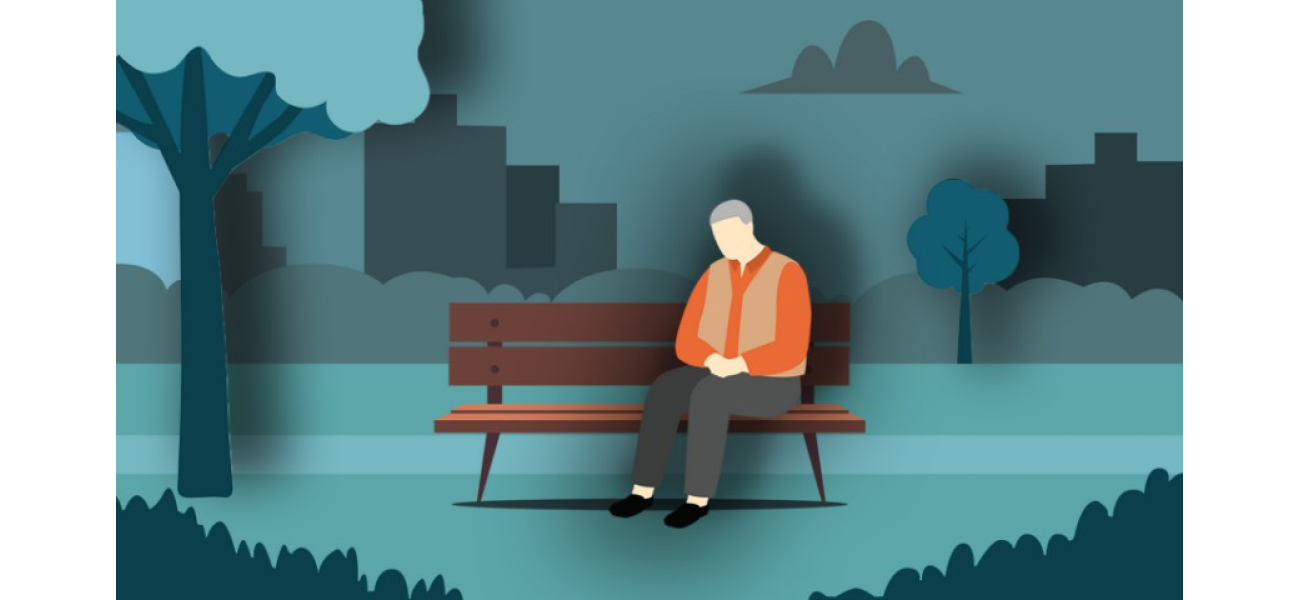Feeling truly lonely is like longing for someone who truly cares.
Life has become more conducive to isolation for everyone.
February 8th 2025.

Feeling lonely can be a difficult and isolating experience. It's a feeling that Maggie Ratcliffe knows all too well. At 84 years old, she carries a small piece of paper in her handbag with instructions in case she has a stroke. Maggie has no family and very few friends. She worries that if something were to happen to her, there would be no one to make sure her wishes are carried out.
Maggie has been living alone since her marriage ended when she was only 27 years old. As an only child, she lost her mother at the tender age of six and her father when she was 18. With no children or extended family, Maggie often feels like she's on her own in the world. "I see people on TV who haven't spoken to anyone in a week, and I know exactly how that feels," she shares with Metro.
"Days can go by without me speaking to anyone, apart from my carers. It's hard. I don't have anyone to grab a cup of coffee with, and everyone else seems to be busy with their own families and friends. I don't get included in their plans, and if I'm not feeling well, no one checks in on me," Maggie explains.
Maggie used to work as a cabin crew member but has since retired. She has overcome cancer, two failed knee operations, and spine degeneration, which leaves her unable to walk more than a few yards. Despite her physical limitations, she still manages to do a bit of gardening while sitting in a chair. She used to volunteer, but her mobility has gotten worse, making it challenging to continue.
"I often think about how nice it would be to go to a garden center or have a day out on a coach with the garden club. But I can't do that, and I can't go alone. Everyone else is paired up, and I end up sitting by myself. It can be tough," she shares.
The Loneliness Epidemic
In a world where we are seemingly more connected than ever before, it may come as a surprise that many people, like Maggie, feel increasingly alone. The World Health Organization even declared loneliness a "global health concern" in 2024. The media has been filled with tragic stories of people who have passed away, and no one noticed for months or even years, highlighting the growing disconnect in our society.
One such case was that of Michael Roy Palmer, who became a recluse and cut off contact with his family. His body was found in his home after a man delivering leaflets noticed him through a window. Michael had been dead for months, and no one had realized. Another heartbreaking story was that of Laura Winham, whose body was found three years after she passed away. She had cut off contact with her loved ones due to her struggles with mental health.
Sadly, this problem is not exclusive to younger generations. Older adults, like Maggie, are also experiencing increasing isolation. According to new research by Age UK, 1.5 million older people rarely leave their homes. The Silverline Helpline, a free telephone service for older people, has heard heartbreaking stories from many individuals, as Ruth Lowe, head of loneliness services at Age UK, shares.
"There have been instances where we couldn't even complete the call because the older person's voice would start to hurt from not speaking to anyone for so long," Ruth explains. "We've found that 270,000 older people go a week without speaking to a family member or friend. It's hard for us to imagine not having any meaningful connections with others."
"We often see older people stuck in a cycle where their loneliness leads to declining health, which only adds to their isolation. They may struggle to take care of themselves and their home or even turn to drugs and alcohol," Ruth continues. Loneliness can bring up negative feelings and make people feel like they don't matter or that no one cares about them.
"I Had Cancer, and My Neighbors Never Came to See Me"
While Maggie does have a weekly coffee and chat at a church friendship group, it's located far from her home. "If I don't show up, no one will even send me a text," she says. "I wish people would take a moment to look out for their elderly neighbors. When I had cancer in 2011, my neighbors never came to check on me. When I was recovering from knee surgery, I didn't see anyone. It was a very depressing time for me."
Maggie lives in fear of having a stroke and not being able to communicate her wishes. "I don't want to end up in a care home, but I have written down my preferences in my handbag. If someone from the hospital looks inside, they will know what I want. I have to think ahead because I have no one else to do it for me," she explains.
"I've already arranged for a woodland burial. I don't want people to come to my funeral if they didn't bother to visit me in real life. If they want to have a drink and remember me, that's fine, but I don't want them standing at my grave," Maggie concludes. Loneliness can have a profound impact on a person's life, and it's essential for all of us to take the time to connect with those who may be feeling isolated and alone.
When a person experiences loneliness, it can be a difficult and isolating experience. They may feel misunderstood and may even withdraw from their loved ones. This is something that Maggie Ratcliffe knows all too well. At 84 years old, Maggie carries a small piece of paper in her handbag with instructions on what to do in case she has a stroke. With no family and only a few friends, she worries that if she were to end up in the hospital, there would be no one to ensure that her wishes are carried out.
Maggie has been living alone since her marriage ended when she was only 27 years old. She is an only child and both her parents passed away at a young age. Without any children or close relatives, Maggie often finds herself feeling lonely and disconnected from others. "I see things on TV about people who haven't spoken to anyone in a week, and I know what that's like," Maggie shares with Metro.
She continues, "There are days when I don't speak to anyone, except for my carers. It can be difficult. I don't have anyone to go out and have a coffee with. Everyone seems to be busy with their families and friends, and I just don't get included. And if I'm not feeling well, no one checks in on me." Despite her challenges, Maggie used to work as a cabin crew member and even volunteered. However, due to her health issues, she is no longer able to do so.
Maggie's limited mobility also makes it challenging for her to do simple activities like going to a garden centre or joining a club outing. "If it's a nice day, I often think about how I would love to go to a garden centre with someone. But I can't do that. I can't even go on a day trip with the garden club, because everyone is in pairs or couples. I end up sitting alone. It's tough," she explains.
The issue of loneliness is becoming more prevalent in today's society, despite the advancements in technology and social media. The World Health Organization even declared loneliness as a global health concern in 2024. Tragic stories of people passing away without anyone noticing for months or even years have been making headlines. One such story is that of Michael Roy Palmer, who lived as a recluse and cut off contact with his family. His body was only discovered when a man delivering leaflets noticed him through a window.
In another heartbreaking case, the remains of Laura Winham were found in her flat three years after her death. She had cut off contact with her loved ones due to her struggles with mental health. Unfortunately, stories like these are becoming more common, especially among older individuals like Maggie. According to new research from Age UK, 1.5 million older people rarely leave their homes.
Ruth Lowe, the head of loneliness services at Age UK, shares that the charity's Silverline Helpline often hears heartbreaking stories from older individuals. "There have been times when we couldn't even complete a call because the person's voice would start to hurt from not speaking for so long," she says. "We know that 270,000 older people go a week without speaking to a family member or a friend. Not having a meaningful connection with anyone is something that many of us find hard to imagine."
Lowe explains that loneliness can create a cycle where a person's health deteriorates, causing them to become more isolated. This, in turn, makes it harder for them to take care of themselves, and they may even turn to unhealthy coping mechanisms like substance abuse. "Loneliness can bring up negative feelings and make a person feel like they have no purpose, that no one is interested in them or values them," Lowe adds.
For Maggie, even attending a weekly coffee and chat session at a church group takes a lot of effort, as it is far from her home. "If I don't show up, no one will even send me a text," she says. She wishes that people would take a moment to look out for their elderly neighbors. "I had cancer in 2011, and my neighbors never came to see me. When I was in bed after a knee replacement, I didn't see anyone. I became so depressed, it was terrible," she shares.
Maggie also lives in fear of having a stroke, as she has no one to advocate for her or ensure her wishes are carried out. "I don't want to go to a nursing home, but I have written down my wishes in a list in my handbag, just in case someone from the hospital finds it. I have to think ahead because I have no one else to do it for me," she explains. Maggie has already made arrangements for a woodland burial, as she doesn't want people to attend her funeral if they couldn't make time to visit her while she was alive.
In conclusion, loneliness is a serious issue that affects many people, especially the elderly. It is important for us to take the time to check on our loved ones, friends, and neighbors, and to create meaningful connections with those around us. As Ruth Lowe says, "There are many ways we can all help to create connections with others." Let us not forget the impact that a simple act of kindness can have on someone who may be feeling lonely and isolated.
Maggie has been living alone since her marriage ended when she was only 27 years old. As an only child, she lost her mother at the tender age of six and her father when she was 18. With no children or extended family, Maggie often feels like she's on her own in the world. "I see people on TV who haven't spoken to anyone in a week, and I know exactly how that feels," she shares with Metro.
"Days can go by without me speaking to anyone, apart from my carers. It's hard. I don't have anyone to grab a cup of coffee with, and everyone else seems to be busy with their own families and friends. I don't get included in their plans, and if I'm not feeling well, no one checks in on me," Maggie explains.
Maggie used to work as a cabin crew member but has since retired. She has overcome cancer, two failed knee operations, and spine degeneration, which leaves her unable to walk more than a few yards. Despite her physical limitations, she still manages to do a bit of gardening while sitting in a chair. She used to volunteer, but her mobility has gotten worse, making it challenging to continue.
"I often think about how nice it would be to go to a garden center or have a day out on a coach with the garden club. But I can't do that, and I can't go alone. Everyone else is paired up, and I end up sitting by myself. It can be tough," she shares.
The Loneliness Epidemic
In a world where we are seemingly more connected than ever before, it may come as a surprise that many people, like Maggie, feel increasingly alone. The World Health Organization even declared loneliness a "global health concern" in 2024. The media has been filled with tragic stories of people who have passed away, and no one noticed for months or even years, highlighting the growing disconnect in our society.
One such case was that of Michael Roy Palmer, who became a recluse and cut off contact with his family. His body was found in his home after a man delivering leaflets noticed him through a window. Michael had been dead for months, and no one had realized. Another heartbreaking story was that of Laura Winham, whose body was found three years after she passed away. She had cut off contact with her loved ones due to her struggles with mental health.
Sadly, this problem is not exclusive to younger generations. Older adults, like Maggie, are also experiencing increasing isolation. According to new research by Age UK, 1.5 million older people rarely leave their homes. The Silverline Helpline, a free telephone service for older people, has heard heartbreaking stories from many individuals, as Ruth Lowe, head of loneliness services at Age UK, shares.
"There have been instances where we couldn't even complete the call because the older person's voice would start to hurt from not speaking to anyone for so long," Ruth explains. "We've found that 270,000 older people go a week without speaking to a family member or friend. It's hard for us to imagine not having any meaningful connections with others."
"We often see older people stuck in a cycle where their loneliness leads to declining health, which only adds to their isolation. They may struggle to take care of themselves and their home or even turn to drugs and alcohol," Ruth continues. Loneliness can bring up negative feelings and make people feel like they don't matter or that no one cares about them.
"I Had Cancer, and My Neighbors Never Came to See Me"
While Maggie does have a weekly coffee and chat at a church friendship group, it's located far from her home. "If I don't show up, no one will even send me a text," she says. "I wish people would take a moment to look out for their elderly neighbors. When I had cancer in 2011, my neighbors never came to check on me. When I was recovering from knee surgery, I didn't see anyone. It was a very depressing time for me."
Maggie lives in fear of having a stroke and not being able to communicate her wishes. "I don't want to end up in a care home, but I have written down my preferences in my handbag. If someone from the hospital looks inside, they will know what I want. I have to think ahead because I have no one else to do it for me," she explains.
"I've already arranged for a woodland burial. I don't want people to come to my funeral if they didn't bother to visit me in real life. If they want to have a drink and remember me, that's fine, but I don't want them standing at my grave," Maggie concludes. Loneliness can have a profound impact on a person's life, and it's essential for all of us to take the time to connect with those who may be feeling isolated and alone.
When a person experiences loneliness, it can be a difficult and isolating experience. They may feel misunderstood and may even withdraw from their loved ones. This is something that Maggie Ratcliffe knows all too well. At 84 years old, Maggie carries a small piece of paper in her handbag with instructions on what to do in case she has a stroke. With no family and only a few friends, she worries that if she were to end up in the hospital, there would be no one to ensure that her wishes are carried out.
Maggie has been living alone since her marriage ended when she was only 27 years old. She is an only child and both her parents passed away at a young age. Without any children or close relatives, Maggie often finds herself feeling lonely and disconnected from others. "I see things on TV about people who haven't spoken to anyone in a week, and I know what that's like," Maggie shares with Metro.
She continues, "There are days when I don't speak to anyone, except for my carers. It can be difficult. I don't have anyone to go out and have a coffee with. Everyone seems to be busy with their families and friends, and I just don't get included. And if I'm not feeling well, no one checks in on me." Despite her challenges, Maggie used to work as a cabin crew member and even volunteered. However, due to her health issues, she is no longer able to do so.
Maggie's limited mobility also makes it challenging for her to do simple activities like going to a garden centre or joining a club outing. "If it's a nice day, I often think about how I would love to go to a garden centre with someone. But I can't do that. I can't even go on a day trip with the garden club, because everyone is in pairs or couples. I end up sitting alone. It's tough," she explains.
The issue of loneliness is becoming more prevalent in today's society, despite the advancements in technology and social media. The World Health Organization even declared loneliness as a global health concern in 2024. Tragic stories of people passing away without anyone noticing for months or even years have been making headlines. One such story is that of Michael Roy Palmer, who lived as a recluse and cut off contact with his family. His body was only discovered when a man delivering leaflets noticed him through a window.
In another heartbreaking case, the remains of Laura Winham were found in her flat three years after her death. She had cut off contact with her loved ones due to her struggles with mental health. Unfortunately, stories like these are becoming more common, especially among older individuals like Maggie. According to new research from Age UK, 1.5 million older people rarely leave their homes.
Ruth Lowe, the head of loneliness services at Age UK, shares that the charity's Silverline Helpline often hears heartbreaking stories from older individuals. "There have been times when we couldn't even complete a call because the person's voice would start to hurt from not speaking for so long," she says. "We know that 270,000 older people go a week without speaking to a family member or a friend. Not having a meaningful connection with anyone is something that many of us find hard to imagine."
Lowe explains that loneliness can create a cycle where a person's health deteriorates, causing them to become more isolated. This, in turn, makes it harder for them to take care of themselves, and they may even turn to unhealthy coping mechanisms like substance abuse. "Loneliness can bring up negative feelings and make a person feel like they have no purpose, that no one is interested in them or values them," Lowe adds.
For Maggie, even attending a weekly coffee and chat session at a church group takes a lot of effort, as it is far from her home. "If I don't show up, no one will even send me a text," she says. She wishes that people would take a moment to look out for their elderly neighbors. "I had cancer in 2011, and my neighbors never came to see me. When I was in bed after a knee replacement, I didn't see anyone. I became so depressed, it was terrible," she shares.
Maggie also lives in fear of having a stroke, as she has no one to advocate for her or ensure her wishes are carried out. "I don't want to go to a nursing home, but I have written down my wishes in a list in my handbag, just in case someone from the hospital finds it. I have to think ahead because I have no one else to do it for me," she explains. Maggie has already made arrangements for a woodland burial, as she doesn't want people to attend her funeral if they couldn't make time to visit her while she was alive.
In conclusion, loneliness is a serious issue that affects many people, especially the elderly. It is important for us to take the time to check on our loved ones, friends, and neighbors, and to create meaningful connections with those around us. As Ruth Lowe says, "There are many ways we can all help to create connections with others." Let us not forget the impact that a simple act of kindness can have on someone who may be feeling lonely and isolated.
[This article has been trending online recently and has been generated with AI. Your feed is customized.]
[Generative AI is experimental.]
0
0
Submit Comment





